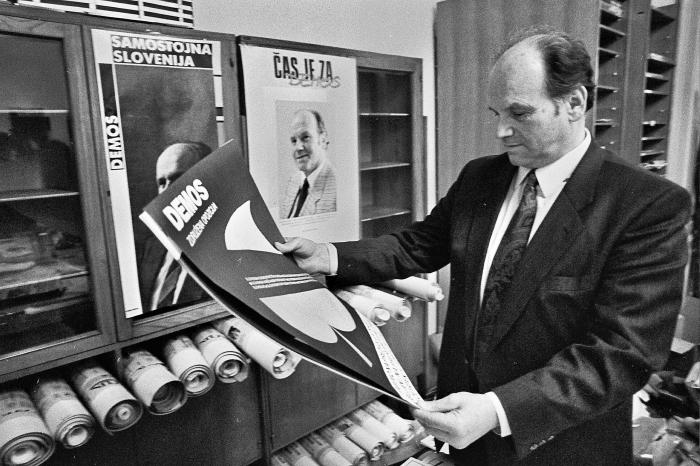
In 2007, Slovenia’s center-right government decided to rename Ljubljana’s international airport after Jože Pučnik, a prominent dissident-turned politician. The decision sparked considerable controversy, however, and reminded observers that the man who rose to prominence as an early supporter of Slovenia’s independence died unloved by the masses.
Pučnik's life was marked by his determination to speak his mind regardless of the consequences. He was expelled from high school for writing critical articles in a student-run newspaper. Still, he was determined to continue his education and obtained a high school diploma after his military service. He went on to graduate from the University of Ljubljana, but continued to speak up against the repression of the Communist authorities.
In 1958, he was arrested for publishing critical articles in a newspaper. He was released in 1963, only to be arrested again the following year for penning another set of controversial articles; he remained in prison until 1966.
That year, he moved to West Germany. Because the Communist authorities in Yugoslavia had revoked his degree, Pučnik began his studies anew in Hamburg, initially making a living as a manual laborer. His hard work paid off and in 1971, he received his doctorate went on to teach in Germany for almost two decades. After decades of struggles, he had finally found some peace and managed to raise a family with his German-born wife.
Pučnik's heart, however, remained in Slovenia, and when Communism collapsed, he returned to his native land. He founded the Social Democratic Party of Slovenia and became one of the most vocal advocates of Slovenia’s independence. In 1990, he ran for the presidency. Even though he was defeated by Milan Kučan, the pro-reform ex-Communist leader of Slovenia, Pučnik emerged as the leader of the opposition DEMOS block, and went on to serve as an MP.
When most other political parties were still considering the future make-up of Yugoslavia, Pučnik insisted that independence was Slovenia’s only option. At the time, his uncompromising position attracted considerable criticism from a number of his political opponents within Slovenia. As the Yugoslav crisis worsened by the end of 1990, however, virtually every politician came to share Pučnik’s view. It turned out that he had been ahead of his time.
Pučnik eventually handed over his party's leadership to Janez Janša, but he remained vocal critic of the LDS-led post-Communist government. As the chair of a special parliamentary committee, he investigated post-World War II killings committed by the Communist authorities. Always candid in his opinions, Pučnik continued to speak his mind about what he saw as past and present injustices in Slovenia until his death in 2003.
However, Pučnik’s principled stances did not make him a popular figure. Eventually, all major parties came to portray themselves as key players in the lead-up to independence. The fact that Pučnik had led the way was often forgotten. He received no presidential awards or honors.
There are many reasons for Pučnik’s relative marginalization. He was not a natural-born politician. He had a colorful life story, but he was an intellectual, not a good public speaker. He had the ideas, but fell short when it came to selling them to the public.
Pučnik was also an outsider. Even though his emigration to Germany was in fact forced exile, some Slovenes viewed his years abroad with distrust and were quick to note that his wife was German. His status as an outsider extended into politics. In the words of the writer Drago Jančar, the reason for Pučnik’s relative lack of popularity was “that a large part of Slovenian society is ideologically deeply conservative and dislikes changes, which is something that Pučnik fought for.”
Today, Ljubljana’s international airport is one of the few public places that bear the name of a man who advocated Slovenia’s independence when such a stance still carried considerable risk.

































































